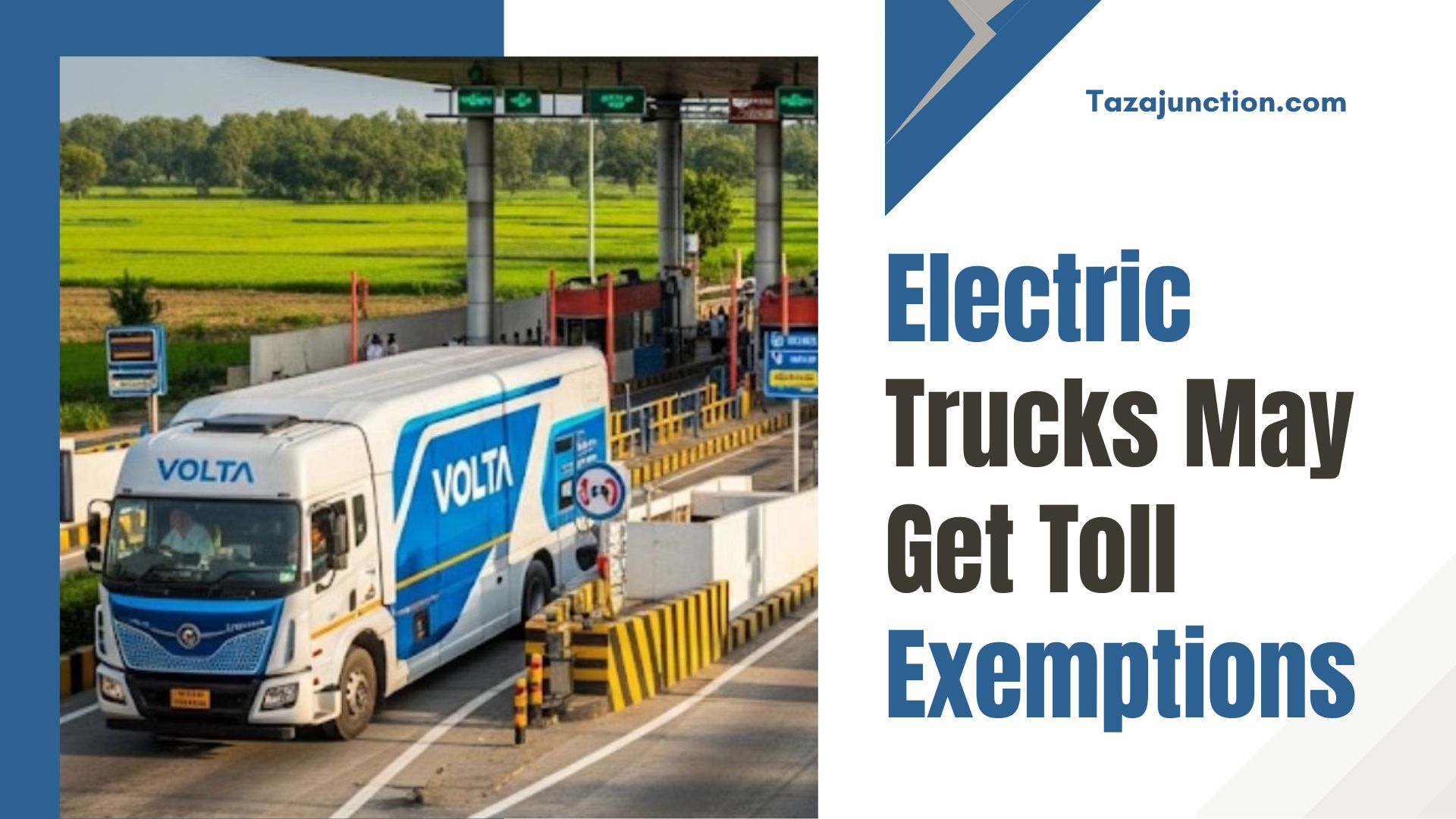India’s transport sector is undergoing a massive transformation with the government pushing for green mobility, sustainable infrastructure, and futuristic logistics.
In a recent statement, Union Minister for Road Transport and Highways, Nitin Gadkari, hinted at a policy shift that could provide significant benefits to commercial EV adoption.
He revealed that electric trucks may get toll exemptions for their extra weight, offering both economic and environmental incentives. This announcement has sparked discussions in the auto and logistics industry about how such a move could reshape the country’s freight ecosystem.
Table of Contents
Why Electric Trucks Are Gaining Momentum
The global push towards electric mobility is no longer limited to passenger cars and two-wheelers. Heavy commercial vehicles, including trucks, are now being electrified to cut emissions and reduce dependence on fossil fuels. India, being one of the largest logistics-driven economies, is gradually embracing electric freight solutions.
The concern with electric trucks lies in their battery weight, which adds significantly to the overall vehicle mass. Traditional toll policies often penalize heavier vehicles, making EV trucks less economically viable compared to diesel trucks.
By acknowledging this challenge, Gadkari’s statement that electric trucks may get toll exemptions for their extra weight reflects a pragmatic approach to encourage EV adoption.
Gadkari’s Vision for Green Logistics
Gadkari has been vocal about reducing India’s oil import dependency and tackling air pollution. He believes electric mobility is not just an environmental choice but also an economic necessity. The idea that electric trucks may get toll exemptions for their extra weight fits into his broader strategy of incentivizing clean transport.
According to him, if operators are penalized for adopting heavier but cleaner trucks, they will hesitate to switch. A toll exemption could balance the operational cost equation, making EV trucks more attractive for long-haul logistics companies.
How Toll Exemptions Could Help?

- Level Playing Field – Diesel trucks don’t carry the burden of heavy batteries, while electric trucks do. Offering exemptions ensures fairness.
- Lower Operating Costs – Freight operators are highly sensitive to cost structures. Since tolls form a big part of expenses, waiving them can tip the scales in favor of EV trucks.
- Faster Adoption – Many fleet owners are on the fence about switching. The idea that electric trucks may get toll exemptions for their extra weight could be a game-changer.
- Boost to Indian EV Industry – Domestic manufacturers investing in EV trucks will get a stronger demand push.
Industry Reactions
The logistics and transport industry has welcomed the statement with cautious optimism. Many operators see this as a long-overdue recognition of EV-specific challenges.
Fleet managers note that if electric trucks may get toll exemptions for their extra weight, it could reduce total cost of ownership and accelerate fleet electrification. However, they also demand clarity on how the exemption will be structured—whether it will be partial, based on extra weight, or a complete waiver.
Automobile manufacturers, especially those investing heavily in EV trucks, are encouraged. They believe this could give them a competitive advantage in convincing customers to make the switch.
Challenges in Implementation
While the announcement is promising, several challenges remain:
- Policy Framework: A uniform national guideline is needed, as toll collection is often managed at state and private concessionaire levels.
- Verification Mechanism: Authorities must clearly define how much “extra weight” will qualify for exemption.
- Revenue Impact: Toll revenue is critical for highway maintenance. Waiving it for EVs means alternate funding mechanisms must be identified.
- Risk of Misuse: Non-electric trucks could attempt to misuse such exemptions unless strict digital monitoring is enforced.
The Bigger Picture: Sustainability Goals
India has pledged to achieve net-zero emissions by 2070. Transport, being a major contributor to carbon emissions, is central to this goal. Encouraging EV trucks is a logical step since the freight sector accounts for nearly 40% of total road transport fuel consumption.
By declaring that electric trucks may get toll exemptions for their extra weight, Gadkari is sending a signal that the government is willing to re-think legacy policies to align with future mobility. Such forward-looking reforms could also improve India’s standing in global clean energy rankings.
Economic Implications
- Cost Savings for Businesses – Lower toll costs would reduce logistics expenses, benefiting industries reliant on road transport.
- Investment Boost – More companies might invest in EV fleets, battery tech, and charging infrastructure.
- Job Creation – The EV truck industry could open new avenues for manufacturing, service, and charging infrastructure employment.
If electric trucks may get toll exemptions for their extra weight, it won’t just be an environmental decision—it will be an economic catalyst.
What This Means for Logistics Giants?
Large logistics companies like DHL, Amazon, and Indian fleet operators have already begun experimenting with electric trucks. However, the cost of ownership remains a hurdle. Toll exemptions could lower running costs significantly, encouraging wider adoption in last-mile and long-haul delivery.
For smaller fleet owners, who are often skeptical of investing in expensive technology, the promise that electric trucks may get toll exemptions for their extra weight could provide the necessary reassurance to make the switch.
Global Perspective
Globally, countries like Norway, Germany, and the US have introduced incentives for electric freight. Toll discounts, tax breaks, and subsidies are common. India aligning with this trend means the nation is serious about competing on the EV front.
By proposing that electric trucks may get toll exemptions for their extra weight, India is not only supporting domestic logistics but also aligning with international best practices.
The Road Ahead
For this policy to succeed, clear guidelines and a robust monitoring system must be in place. Authorities will need to collaborate with toll operators, fleet owners, and EV manufacturers to ensure smooth rollout.
Technology solutions like RFID, GPS, and weight sensors can help identify qualifying vehicles and prevent misuse. At the same time, infrastructure for charging heavy-duty trucks must be scaled up rapidly.
Conclusion
The announcement by Nitin Gadkari that electric trucks may get toll exemptions for their extra weight is a bold step toward accelerating India’s EV transition. It acknowledges the unique challenges faced by heavy commercial EVs and offers a practical solution to balance economics with sustainability.
If implemented effectively, this move could not only boost EV adoption but also strengthen India’s logistics sector, reduce emissions, and support the nation’s net-zero goals.
As the country gears up for a greener future, such progressive policies could make India a global leader in clean freight solutions. The road ahead is challenging, but with innovative measures like toll exemptions, the EV revolution for trucks seems closer than ever.

